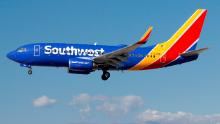Delta and United Airlines caught up in rising US-China tensions
Washington has accused Beijing of blocking American carriers from resuming flights to China, prompting US authorities to more heavily scrutinize Chinese airlines.
The tit-for-tat began last week after the US Department of Transportation claimed that regulators in Beijing were “making it impossible” for US carriers to fly between the two countries.
The problem facing the US carriers is that the CAAC, in an effort to stop imported cases of Covid-19, ordered all airlines to use their flight schedules for the March 16-22 week as a benchmark to determine how many flights they could operate to China until further notice. By that date, US airlines had “completely ceased flying passenger service to China,” according to the Department of Transportation.
Newly reported virus cases in China are few in number and the majority stem from those who return to the country from elsewhere. Fear remains high among the public that China could see a surge in new cases if large numbers of international flights are allowed to resume — especially from countries like the United States, where the death toll alone is nearing 100,000 and where confirmed cases have reached more than 1.6 million.
The CAAC has not responded to United and Delta’s requests to resume operations, according the US agency.
Meanwhile, several Chinese airlines have continued to fly US-China routes throughout the pandemic. But the Chinese aviation regulator has limited each of them to operating just one weekly flight to the United States.
The Chinese aviation regulator told US officials that they are considering removing the March benchmark, but the cap of one weekly flight to China would also be imposed on US airlines. That would violate an air transport agreement between the two countries.
In response, the Department of Transportation on Friday issued an order requiring Chinese airlines that fly to the United States to file flight schedules with the US government, including details about the type of equipment used, the frequency of each flight, specific airports served at each point, and arrival and departure times.
Once those details are submitted, the department will then determine whether the flights “may be contrary to applicable law or adversely affect the public interest,” according to the order. The Chinese carriers — including Air China, China Eastern, China Southern and Hainan Airlines — must file the information by Wednesday.
Beijing on Monday denounced the new restrictions.
“China is opposed to any US measures that may disrupt or restrict Chinese carriers’ normal commercial passenger flights,” Chinese Foreign Ministry spokesman Zhao Lijian said during a regular press briefing.
Zhao also pushed back against Washington’s claims that it was preventing US carriers from operating in China, adding that the country’s measures are “open, fair and transparent.”
As part of its requirements for US airlines, the CAAC also wants those carriers to accept liability if any passenger who arrives on their flights tests positive for Covid-19 in China, according to a person familiar with the matter who was not authorized to speak on the record. That would also violate the countries’ air transport agreement.
Moreover, Chinese carriers have filed an unprecedented number of requests for passenger charters — more than a dozen per week, the person said. These charters are being organized by the Ministry of Foreign Affairs to repatriate Chinese students.
But the flights are also carrying Chinese commercial passengers to and from the United States, the person said. US carriers have been told that only Chinese airlines are eligible to provide these repatriation services, the person said.
United declined to comment on the matter. United spokesperson Leslie Scott said the airline looks forward to resuming passenger flights between the United States and China “when the regulatory environment allows us to do so.”
Delta did not respond to a request for comment.
China is an important international market for both US airlines, according to John Grant, an analyst with aviation analytics firm OAG.
Last May, China was United’s sixth largest international market based on seats offered, and the ninth largest international market for Delta, Grant said. In terms of overall capacity, however, China represents less than 1% of either carrier’s total network, because domestic flights make up the bulk of their business.
Nevertheless, “access to China in the recovery out of Covid-19 is important from both a passenger and cargo re
venue perspective, and importantly a wider catalyst to reopening global trade once again,” Grant said.


